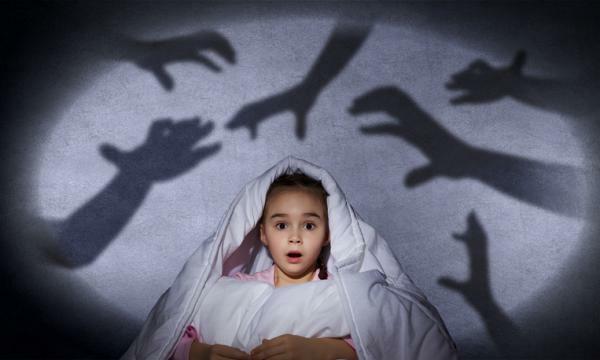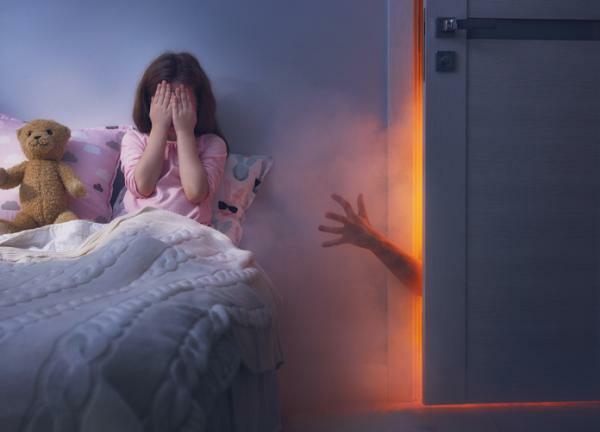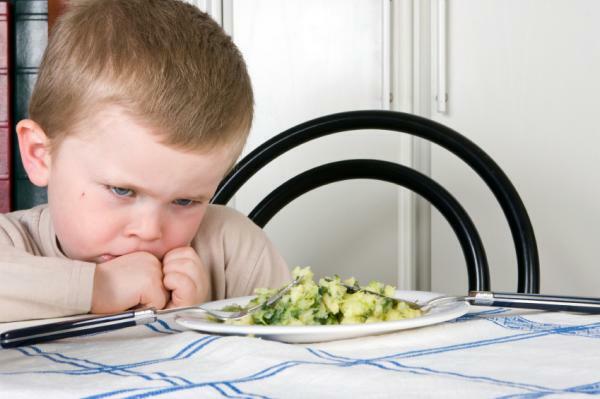
Many children are afraid of sleeping alone. We can notice this fear when it is time to go to sleep and the child resists or refuses to do so, makes excuses for not going to sleep, expresses that he has a tummy ache as he goes. about bedtime, when he wants to sleep with the light on, when he calls his parents continuously at night to come to his bedroom to pay attention, when the child constantly complains that he cannot sleep, is restless, when he has a late conciliation of sleep, is tired in the morning and during the rest of the day, between others. If you are a mother or father and you find yourself in this situation with your children, do not hesitate to continue reading this article from Psychology-Online: my son is afraid to sleep alone: what do I do?
Index
- My son is afraid to sleep alone. Why?
- Fear of sleeping alone according to age
- How to overcome fear of sleeping alone
My son is afraid to sleep alone. Why?
There are many aspects that can cause the fear of sleeping alone that a child can present. Among these we find:
Fear of the dark
Fear of the dark in children It is very common, but as the child grows, this fear begins to decrease, although in some cases persists and then becomes a non-evolutionary fear (that is, it is not part of the fears of the age). Being afraid of the dark is not the cause of the fear of sleeping alone, but it is an aspect closely related, since if the child is afraid of the dark, sleeping implies locking himself in a dark room.
Nightmares
Such dreams cause anxiety in the child and cause him to wake up in anguish, screaming and full of fear. Unlike in night terrors, nightmares have the advantage that the child can remember and explain what she has dreamed of in details. Usually, nightmares are related or represent some external phenomenon that causes restlessness and anguish in the child, such as, for example, if the child is anxious to go to school because a classmate is always waiting for him to mess with him, he may have nightmares related to this situation. This causes the child to be afraid to go to sleep because he knows that he can have very realistic nightmares in his opinion.
It is important differentiate nightmares from night terrors. Night terrors occur when sleep is very deep. They cause the child, while he is still sleeping, to sit up in bed abruptly, screaming exaggeratedly, as if he were suffering in a way excessive, with a pale appearance, with the presence of crying, cold sweat, tachycardia, with a face that indicates that it is terrified and he finds himself in a panic attack, is unable to contact reality, does not react to stimuli and is not aware of what is happening to him around. Horror episodes usually last between 2 and 10 minutes and during the episode it is difficult to wake or comfort the child. It is common for parents to be scared, since their son does not recognize them, but that is because he continues to sleep. The next morning, when the child wakes up, he is unable to remember anything or almost nothing of the content of his dream, but he does wake up with discomfort and anguish. Night terrors are common between the ages of 3 and 6, but if they occur frequently or persist into advanced age, they can be a problem
Bad habits
Having bad habits before going to sleep or during the night, implies difficulties for the child to learn to sleep alone and not be afraid. For example, if the parents have been sleeping in the same bed as the child during their first years of life, the day they decide that the child should sleep alone in his room, the child will refuse. It is important to note that it should not be the child who decides what he needs before going to sleep or when he is in bed, but it is the parents who must teach their child the habit of going to sleep. Another example could be letting the child watch television programs that activate her body, which will cause the child to go to sleep without an ideal calm environment to fall asleep. Among bad sleep habits, we can also include nightmares, that is, if a child wakes up scared due to a nightmare and parents decide to sleep with them the rest of the night, we are creating a bad habit.
Fear of sleeping alone according to age.
Children often have difficulty sleeping alone due to fears that are normative for their age. Children can show age-specific fears, which will decrease as they grow, but while they have these fears, it is due to learn to live with them and learning to sleep alone despite these fears. For example, when the child is with the light off, without visual stimuli, it is common for her creativity and imagination to play tricks on her, imagining monsters. So children do not feel safe in their room and prefer to sleep with their parents, since, Although they continue to imagine fantastic creatures, they will be next to their parents and feel more protected.
Another fairly frequent example that is typical of age is the fear of separation or abandonment of their parents. This fear is common in the first years of life of children. It occurs when the limits of the separation of the father figures are broken. Wanting to be with parents and not be separated from them is due to the need to feel protected and safe from possible dangers. Therefore, children may see some separations as situations of terror, since they are not able to know how long that separation will last or they may even think of abandonment. Thus, when children are left alone in their room, they can develop behaviors such as crying, yelling, tantrums, throwing themselves to the floor, trying to hold on to the parents, etc., with the intention that the parents return to her room to dedicate attention.
It is also important to bear in mind that a child, from six or seven months onwards, should be able to go to bed without crying, go to bed with joy, reconcile sleep on his own, sleep at once for about 11 or 12 hours (or as many hours as he needs, sometimes fewer hours is enough) and be able to sleep in his bed and with the light off. Before these six or seven months, it is usual for the child to cry in the middle of the night, since every few hours he must feed on breast milk. Therefore, from these months we must ensure that the child sleeps in his bed and promote proper sleep habits, to prevent fear of sleeping alone and persisting for years to come. Although it is normal for the child to cry and scream for the attention of his parents if it is medical aspects, such as difficulties in breathing or colic.

How to overcome fear of sleeping alone.
How to overcome fear of sleeping alone? First of all, in order to create a good sleep habit it is necessary that parents are calm and safe of what they are doing and always doing the same, so that the child associates this ritual with sleep.
It is recommended that, at the beginning, the new situation be explained to the child, that is, explain that from that night on, he will have to learn to sleep alone. At the same time, when it is explained to him that they will start from scratch, he is also due reassure with a little speech, for example, telling him that even if he has to sleep, only the parents will be close to him, but that in his room he has to your doll that will keep him company and that sleep will allow him to rest so that the next day he wakes up with the batteries charged. If the child wakes up crying and screaming at night because he wants to sleep with his parents, he should go to his room but not enter or take him in her arms, just trying to calm him down by saying that the parents are there but that he has to sleep alone and that nothing is wrong, trying to reassure you.
To help a child with fear to sleep alone, it is recommended create rituals before going to bedSuch as showering, dining, reading a story, giving the reassuring speech, and going to sleep. Another example could be to explain a picture that the child has made of the Sun and the Moon, and each night, before going to sleep, explain the picture saying that When the Sun rises we must go to school, be awake and happy, but when the Moon arrives we must go to sleep and the Moon will watch us from the Darling. Each family will create the correct habit that they consider, depending on the tastes and age of their child, but with these repetitive habits it is intended that the child get used to them, with the purpose that sooner or later, if the ritual is not performed, the child is able to associate sleep with something good, which allows him to rest and get up with more energy each day following.
On some occasions, it is also recommended prevent the child from sleeping during the day or limit his nap time, as nightfall may find it difficult for him to decrease her activity. On the other hand, if the child does not sleep during the day, he could arrive more tired at bedtime and have more facilities to fall asleep. It is important to note that this is not feasible for all cases, you must know your child well to know if this will be effective or not. It is also recommended, to overcome fear of sleeping alone, try to create a calm environment before going to sleep in order not to exalt the child.
In addition, to overcome fear of sleeping alone, it is also important to give the child answers about her progress, that is, if the child makes an effort and shows progress, even little by little, he should be congratulated, congratulated, but not with material objects. If the child sees that her parents are happy with her progress and are proud, this will make the child want to achieve what he sets out to do.
How to help a scared child to sleep only from nightmares or night terrors
- In the case of nightmares, it is recommended to help reassure the child, give him security and how, unlike night terrors, the child can explain her nightmare to his parents, allows parents to try to disprove their children's dreams by making them come true (for example, by ensuring that there is no monster under their bed). But above all, it is not recommended at all to take the child to the parents' bed, since this would create bad sleep habits.
- In the case of night terrorsAs the child continues to sleep, it is not recommended to wake him up, because then he will find himself stunned without understanding what is happening and with a feeling of anguish in the body that will make it difficult to to sleep. Therefore, what is recommended is to stay with the child in case he moves very abruptly and is in danger it falls to the ground or is hit, otherwise, it is a matter of waiting trying to maintain the Calm down.
Finally, it is also recommended to go to a specialist to assess the situation and, in this way, you can communicate his recommendations based on each particular case. If you doubt, you can consult this article to know when to see a child psychologist.
This article is merely informative, in Psychology-Online we do not have the power to make a diagnosis or recommend a treatment. We invite you to go to a psychologist to treat your particular case.
If you want to read more articles similar to My child is afraid of sleeping alone: what do I do?, we recommend that you enter our category of Emotional and behavioral disorders.
Bibliography
- Albalat, B., and Peraita, B. (s.f.). Childish fears, children afraid to sleep alone.
- Red Cross. (s.f.). Good sleep habits.
- Estivill, E., De Bejar, S. (2003). Go to sleep kid. How to solve the problem of childhood insomnia. Barcelona: editorial Debolsillo
- Méndez, X., Orgilés, M., and Rosa, A.I. (2005). Psychological Treatments in Dark Phobia: A Quantitative Review. Annals of Psychology, 21 (1), 73-82.
- Morales, Z. (2013). Cognitive-behavioral intervention in a case of sleep phobia in childhood. Ibero-American Journal of Psychosomatics, 107, 46-51.


